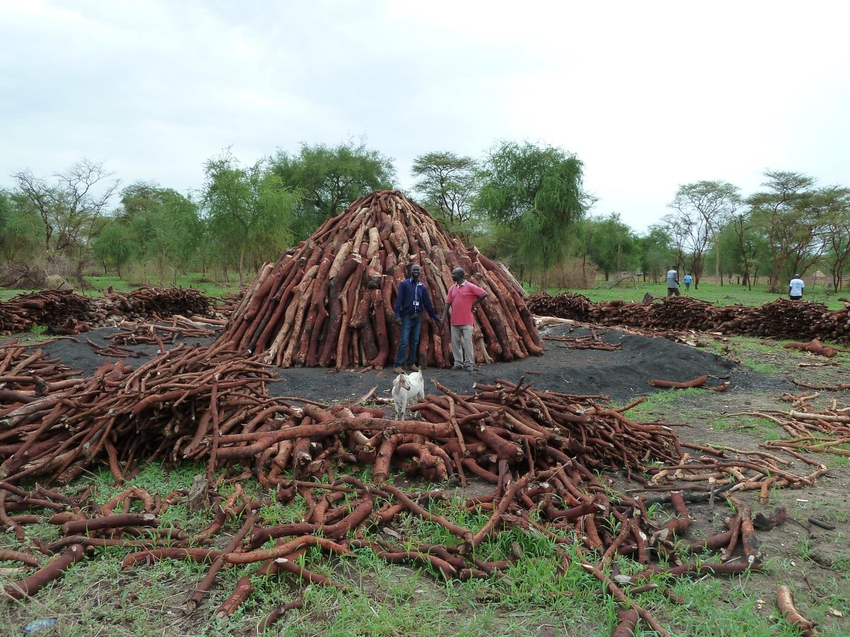
By Peter Kuol Kuch
In Bor- Jonglei State, the large-scale charcoal production is fuelling rapid deforestation, as economic hardship pushes many residents to rely on charcoal burning for their livelihood. Despite the growing environmental threat, the Jonglei State Ministry of Agriculture, Environment and Forestry has yet to implement effective measures to regulate the practice.
Bor, many residents now depend on charcoal for energy. And even that is becoming costly
Mrs Achok Rabecca explained that a single bag of charcoal now costs close to 100,000 South Sudanese Pounds, an amount equivalent to 15 US dollars.
‘’ Yes, the charcoal is becoming so expensive it’s almost 90, 000 SSP. Now, apart from transport which costs 10,000 SSP, people are still buying because there is no way. It could be good if our government can initiate gas so that it can be used as source of energy, I see it can mitigate this extensive cutting of trees for charcoal.’’ He said.
She is urging local authorities to provide alternative sources of energy to reduce the country’s heavy reliance on charcoal.
Meanwhile Deng Ayuen, a Charcoal producer in Bor emphasized that they turn to charcoal production simply as a means of survival.
‘’ In 2012, I started making charcoal, but I stopped a bit and later resumed in recent years doing this same activity. It’s because it earns me money to feed my family. But then when I do this activity I always spare the fruit bearing trees. They are very important.’’ Deng Said.
He emphasized that producers are willing to abandon the trade if the government can ease economic hardships and make the cost of living more affordable,
Although the Ministry of Agriculture, Environment and Forestry has yet to fully enforce forestry policies, efforts are underway. The ministry says training programs on the importance of tree planting have been introduced.
William Nyuon, a trained Agronomist in Bor, said these initiatives are beginning to show positive results.
‘’ Yes, it’s progressing well, the teak I had planted has now grown and it’s pruning work that is done in order to grow tall, they were about 7,400 seedlings, they are progressing well. Teak is the simplest tree in term of planting, because it doesn’t require a lot of water or needs to be irrigated all the time.’’ William stated.
Mr. William is encouraging fellow citizens across Jonglei to launch similar large-scale initiatives to replace the trees lost through charcoal production
Meanwhile, the Secretary General of the Jonglei State Civil Society Network Manyang James stressed the need for South Sudan to inform communities about existing forestry laws and policies to protect natural resources.
“Since it has become the source of livelihood, it’s important to educate the people that once you cut down the tree, there is a need to plant another one in order to replace the one cut. It’s also important for the government to improve insecurity in the region, this can allow people to settle in their villages and none will be bothered again by the charcoal. It’s important to lay Policies that govern the forestry and educate the people about them’’ he said.
Mr. James noted that the rising demand for charcoal is partly linked to insecurity, which has forced many residents to migrate into nearby towns, increasing their reliance on charcoal as their main source of energy.
The Director General of the Ministry of Agriculture, Environment and Forestry in Jonglei State, Michael Gatchang, acknowledged that large-scale charcoal production has caused significant environmental degradation across the state.
“It can cause respiratory illness on the human body, which lower the human weight. It’s can cause deforestation which all see. But with this, even in the ministry it’s provident and the ministry has got what is so called environment and forestry bill. But since it’s the mean of survival, there we come up with the policy of planting more trees, and here we have state central nursery where we plant more than 25000 seedlings’’ Michael Said.
Gatchang stated that the ministry has established seedbeds and greenhouses, encouraging residents to take part in tree planting initiatives aimed at restoring the environment and protecting the ecosystem.
Editor’s note: This story was reported with support from Journalists for Human Rights, under the Tackling Mis/Disinformation Project, funded by the Government of Canada’s Peace and Stabilization Program.’’
